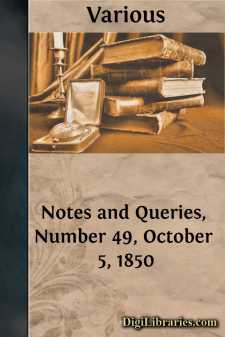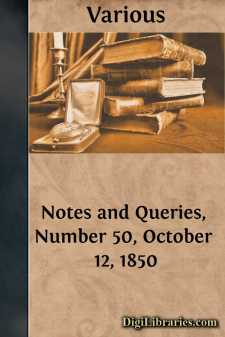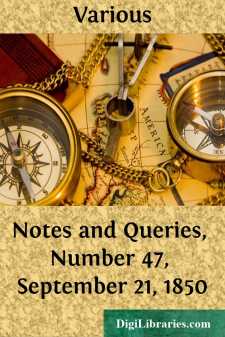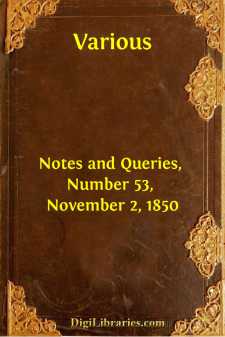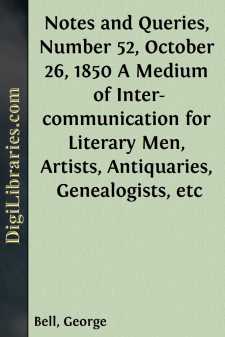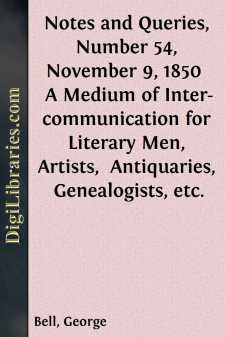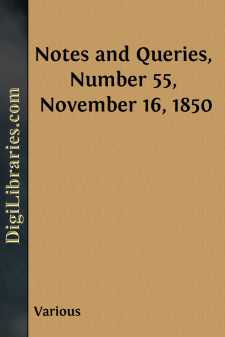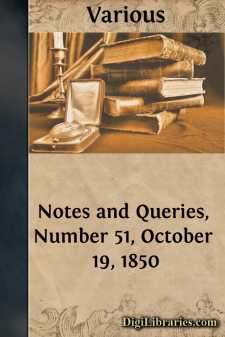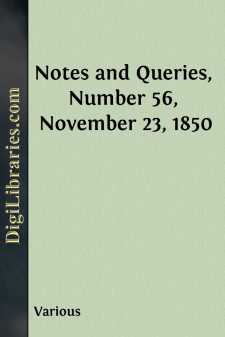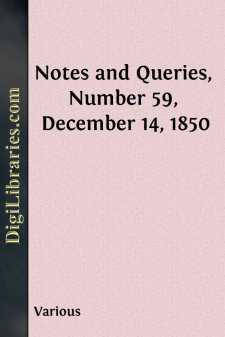Periodicals
- Art 27
- Children's periodicals 59
- Entertainment 5
- Food/Wine 2
- Games/Humor 455
- General 661
- Health 1
- History 53
- House/Home 1
- Regional 62
- Science/Nature 118
- Transportation 10
Periodicals Books
Sort by:
by:
Various
NOTES. STRAY NOTES ON CUNNINGHAM'S LONDON. The following notes are so trivial, that I should have scrupled to send them on any other ground than that so well-conceived and labouriously-executed a work should have its most minute and unimportant details as correct as possible. This, in such a work, can only be effected by each reader pointing out the circumstances that he has reason to believe are...
more...
by:
Various
NOTES. A NOTE ON "SMALL WORDS." "And ten small words creep on in one dull line." Most ingenious! most felicitous! but let no man despise little words, despite of the little man of Twickenham. He himself knew better, but there was no resisting the temptation of such a line as that. Small words he says, in plain prosaic criticism, are generally "stiff and languishing, but they may be...
more...
by:
Various
NOTES. OLD SONGS. I heard, "in other days," a father singing a comic old song to one of his children, who was sitting on his knee. This was in Yorkshire: and yet it could hardly be a Yorkshire song, as the scene was laid in another county. It commenced with— "Randle O'Shay has sold his mare For nineteen groats at Warrin'ton fair," and goes on to show how the simpleton was...
more...
by:
Various
NOTES SHAKSPEARE AND MARLOWE. A special use of, a use, indeed, that gives a special value to your publication, is the communication through its means of facts and conclusions for the information or assistance of editors or intending editors. I do not suppose that any gentleman occupying this position would be guilty of so much disrespect to the many eminent names which have already appeared in your...
more...
by:
George Bell
ADDRESS TO OUR FRIENDS. We this day publish our fifty-second Number. Every Saturday, for twelve months, have we presented to our subscribers our weekly budget of "Notes," "Queries," and "Replies;" and in so doing, we trust, we have accomplished some important ends. We have both amused and instructed the general reader; we have stored up much curious knowledge for the use of...
more...
by:
George Bell
ENGLISH AND NORMAN SONGS OF THE FOURTEENTH CENTURY. In a vellum book, known as The Red Book of Ossory, and preserved in the archives of that see, is contained a collection of Latin religious poetry, written in a good bold hand of the 14th century; prefixed to several of the hymns, in a contemporary and identical hand, are sometimes one sometimes more lines of a song in old English or Norman French,...
more...
by:
Various
NOTES. AUTHORSHIP OF "HENRY VIII." In returning to the question of the authorship of Henry VIII., I am anxious to remove a misconception under which MR. SPEDDING appears to labour relative to the purport of a remark I made in my last communication to you (Vol. ii., p. 198.) on this subject. As we appear to be perfectly agreed as to the reasons for assigning a considerable portion of this play...
more...
by:
Various
NOTES. ROBERD THE ROBBER. In the Vision of Piers Ploughman are two remarkable passages in which mention is made of "Roberd the robber," and of "Roberdes knaves." "Roberd the robbere, On Reddite loked, And for ther was noght wherof He wepte swithe soore." Wright's ed., vol. i. p. 105. "In glotonye, God woot, Go thei to bedde, And risen with ribaudie, The Roberdes...
more...
by:
Various
NOTES. THE OLDENBURG HORN. The highly interesting collection of pictures at Combe Abbey, the seat of the Earl of Craven, in Warwickshire, was, for the most part, bequeathed by Elizabeth, Queen of Bohemia, the daughter of James I., to her faithful attendant, William, Earl of Craven. The collection has remained, entire and undisturbed, up to the present time. Near the upper end of the long gallery is a...
more...
by:
Various
NOTES. THE FIRST PAPER-MILL IN ENGLAND. In the year 1588, a paper-mill was established at Dartford, in Kent, by John Spilman, "jeweller to the Queen." The particulars of this mill are recorded in a poem by Thomas Churchyard, published shortly after its foundation, under the following title:— "A description and playne discourse of paper, and the whole benefits that paper brings, with...
more...


